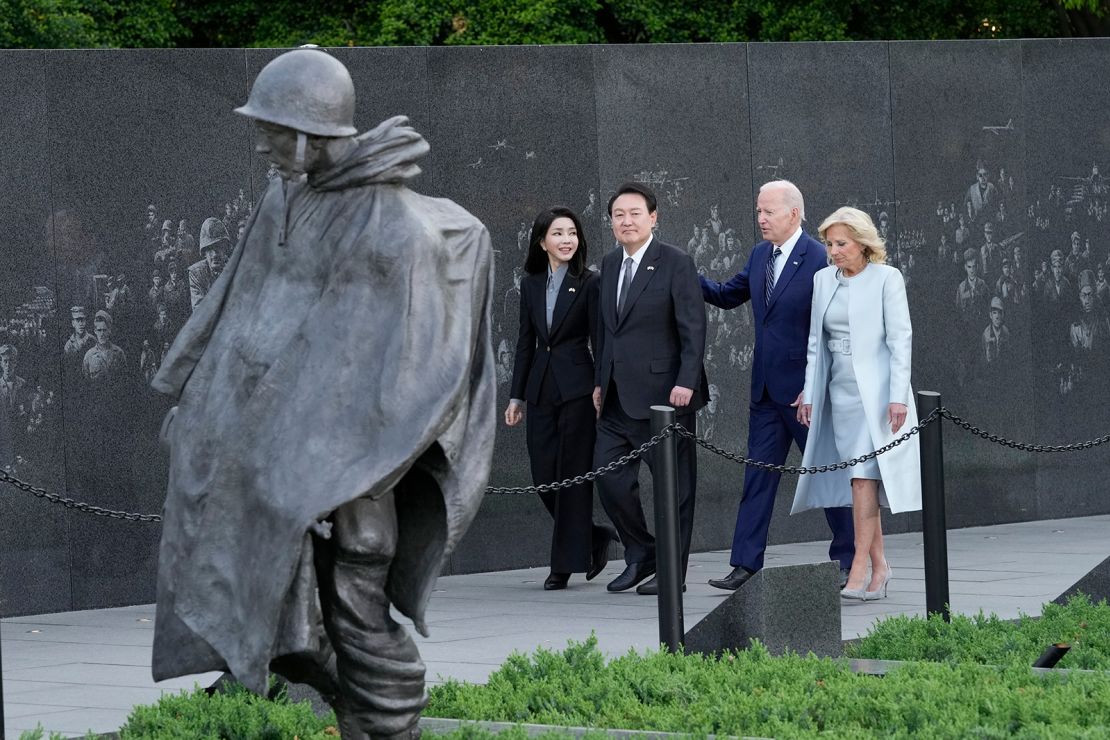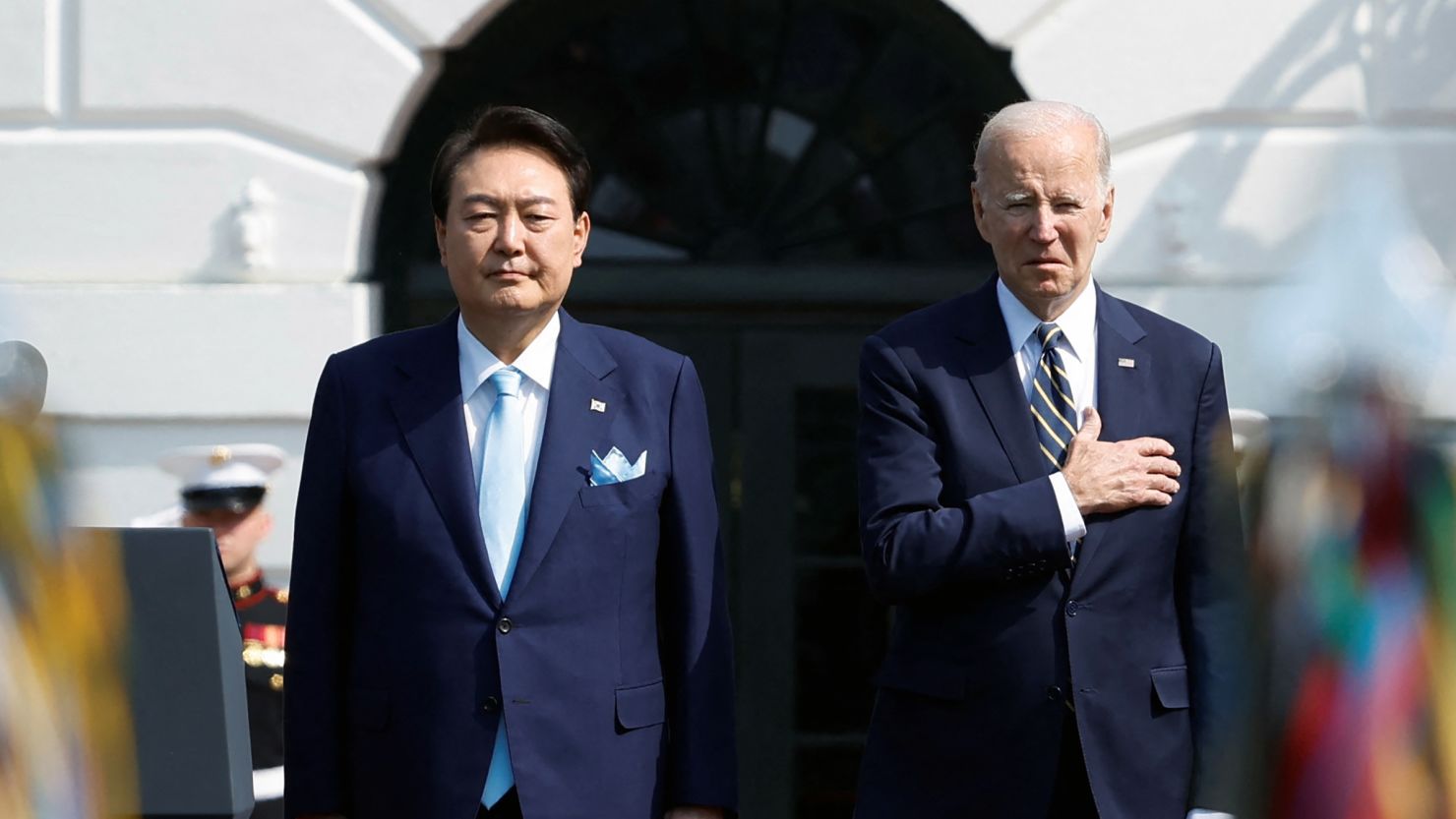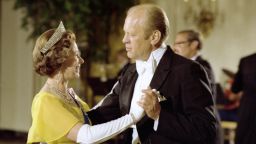President Joe Biden and South Korean President Yoon Suk Yeol announced a key new agreement at the White House on Wednesday that aims to deter North Korean aggression, including a new US commitment to deploy a nuclear-armed submarine in South Korea for the first time since the early 1980s.
In a joint news conference at the White House Biden hailed what he called the “ironclad” alliance between the two countries.
“The alliance formed in war and has flourished in peace,” Biden said from the Rose Garden at the White House. “Our mutual defense treaty is iron clad and that includes our commitment to extend a deterrence – and that includes the nuclear threat, the nuclear deterrent.”
“They’re particularly important in the face of DPRK’s increased threats and the blatant violation of US sanctions,” Biden added.
The product of monthslong discussions between officials from both countries, the new agreement will say that the US “(intends) to take steps to make our deterrence more visible through the regular deployment of strategic assets, including a US nuclear ballistic submarine visit to South Korea, which has not happened since the early 1980s,” the official said. Officials made clear that such assets will not be stationed permanently, and there is “no plan” to deploy any tactical nuclear weapons to the Korean peninsula.
“The bottom line here is there’s even closer cooperation, closer consultation and, and we’re not going to be stationing nuclear weapons on the peninsula, but we will have visits to ports, visits of nuclear submarines and things like that,” Biden said as he heralded the agreement, which he called a “prudent step” to reinforce extended deterrence.
The decision to strengthen extended deterrence – a US policy that uses the full range of military capabilities to defend its allies and position additional American nuclear resources in the region amounts to an acknowledgment that attempts to deter North Korea from advancing its own nuclear program have stalled. Attempts at diplomacy with dictator Kim Jong Un have gone mostly unanswered as the North escalates its missile tests and potentially prepares for another nuclear test.
Warning to Kim
Biden offered a stark warning to Kim in the press conference.
“A nuclear attack by North Korea against the United States or its allies and partners is unacceptable, and will result in the end of whatever regime were to take such an action,” Biden said.
It was direct notice to the North Korean dictator that the United States would defend its treaty ally to his south, and precisely the type of message Yoon arrived in Washington hoping to hear.
“Sustainable peace on the Korean Peninsula does not happen automatically,” Yoon said, “Our two leaders have decided to significantly strengthen extended deterrence of our two countries against North Korea’s nuclear and missile threats so that we can achieve peace through the superiority of overwhelming forces and not a false peace based on the goodwill of the other side.”
Biden welcomed Yoon to the White House for the full pomp and circumstance and hospitality of an official state visit – a high-stakes meeting amid ongoing provocations from North Korea, China’s growing influence in the Indo-Pacific region and a recent leak of Pentagon documents.
As he welcomed Yoon, Biden called the alliance “the linchpin of regional security and prosperity” in the Indo-Pacific.
And more broadly, the visit signals the importance with which the US views its relationships with allies in the Indo-Pacific, this trip coming one week before Biden hosts Philippines President Ferdinand Marcos and weeks before Biden is expected to travel to the region himself.
In the news conference the President also noted the trilateral relationship between US, South Korea and Japan, praising President Yoon’s efforts.
“I want to thank you again Mr. President for your political courage and personal commitment to diplomacy with Japan,” Biden said.
The ‘Washington Declaration’
Biden and Yoon unveiled the “Washington Declaration,” a set of new steps to boost US-South Korean cooperation on military training, information sharing and strategic asset movements in the face of a recent spate of missile launches from North Korea.
It is intended to send a clear message: “What the United States and the ROK plan to do at every level is strengthen our practices, our deployments, our capabilities, to ensure the deterrent message is absolutely unquestioned and to also make clear that if we are tested in any way that we will be prepared to respond collectively and in an overwhelming way,” a senior administration official said.
The declaration includes the deployment of the nuclear ballistic submarine. Additionally, the US and Korea will also “strengthen our training, our exercises and simulation activities to improve the US-ROK alliance’s approach to deterring and defending” against North Korean threats, per the official.
It also creates the “US-ROK Nuclear Consultative Group,” which the official said will convene regularly to consult on nuclear and strategic planning issues, with the hope that it will give allies “additional insight in how we think about planning for major contingencies.” That group is modeled after US engagement with European allies during the height of the Cold War, the official said.
After a year in which North Korea fired a record number of nuclear missile tests, South Korea’s President Yoon earlier this year spoke about possibly deploying US tactical missiles on the Korean peninsula or even developing the country’s own set of nuclear weapons. i
While he dialed back his remarks, those are both scenarios the Biden administration wanted deeply to avoid, and White House officials spent recent months looking for ways to reassure South Korea by bolstering the alliance, including considering a plan to incorporate nuclear exercises into the war planning the two nations already do together, according to two senior Biden administration officials.
“We need to have tabletop exercises that go through a variety of scenarios, including possibly nuclear weapons,” a senior official told CNN earlier this month.
“The South Koreans don’t have experience in using nuclear weapons. This is why we need to do tabletop exercises with them. The Koreans need to be educated in what it means to use nuclear weapons, the targeting, and the effects,” said David Maxwell of the Foundation for Defense of Democracies, adding that there will be no change to the US having control on the targeting. “The hope is that this will satisfy them and improve readiness.”
The hope, the officials said, was that this offer – along with sustained engagement to develop other ideas to implement – will provide the alternative that the South Koreans need.
Also on the agenda
Beyond the declaration, Biden and Yoon are celebrating 70 years of the US-South Korea alliance, highlighting close economic ties between the nations, pointing to cooperation on issues like climate change and the Covid-19 pandemic, and looking toward ways to continue supporting Ukraine amid Russia’s ongoing invasion, plus a new dialogue on cyber cooperation. They are also expected to announce a new student exchange program focused on STEM “that will significantly increase the number of students going in both directions,” a second senior official said.
And Biden praised Yoon for his “courageous, principled diplomacy with Japan,” saying it has “strengthened our trilateral relationship” and “makes an enormous difference.” A stronger alliance between those two countries is strategically important to the US as it looks for ways to counter China’s rising influence.
Leaks loom
Recent online leaks of Pentagon documents involving South Korea also loom over the visit. One of the leaked documents describes, in remarkable detail, a conversation between two senior South Korean national security officials about concerns by the country’s National Security Council over a US request for ammunition.
The officials worried that supplying the ammunition, which the US would then send to Ukraine, would violate South Korea’s policy of not supplying lethal aid to countries at war. According to the document, one of the officials then suggested a way of getting around the policy without actually changing it – by selling the ammunition to Poland. The document sparked controversy in Seoul.
The leaks “caused the press to push him (Yoon) more on this. And we’re hearing more and more about how he feels about the issue,” Dr. Victor Cha, Korea chair at the Center for Strategic and International Studies, said in a recent briefing.
Cha continued, “Korea has one of the largest, if not the largest, stockpile of munitions of any country in the world. And they also have tremendous production capacity in terms of munitions. And if there’s one thing that Ukraine needs in this war and that NATO allies who are supporting Ukraine need in this war, it’s munitions. So I would say to watch this space,” adding that it is unlikely that an announcement will be made during this state visit.
And the White House emphatically stated Tuesday that US commitment to its security partnership with South Korea is “ironclad” despite those leaks, press secretary Karine Jean-Pierre declining to say whether it would be a topic of discussion between Biden and Yoon.
Pressed during the press conference on whether the leaks came up, Yoon declined to say.
“We are communicating between our two countries and we are sharing necessary information. I believe that investigation is underway in the United States. Various and complex variables are always in play. We need time to wait for the investigation results by the United States and we plan to continue to communicate on the matter,” Yoon said, via a translator.
More broadly, Russia’s war in Ukraine is expected to be a key topic of discussion, with both leaders expected to continue to promote the importance of democracy, and a fulsome conversation expected on “what comes next for Korea’s support for Ukraine,” a third official said.
“Ultimately, there’s no country that has probably a better sense of the importance of the international community standing together to support a country that’s completely invaded than the ROK,” the second senior official said.
Plans and pomp
Wednesday’s events mark just the second state visit of the Biden presidency (Biden hosted French President Emmanuel Macron and his wife Brigitte in December 2022).
The visit began informally Tuesday as the Bidens welcomed Yoon and his wife, Mrs. Kim Keon Hee, for an evening trip to the Korean War Memorial.

The South Korean guests were formally received with an official arrival ceremony Wednesday morning on the South Lawn ahead of a bilateral meeting with the presidents and their staffs, followed by a joint press conference.
In remarks at the arrival ceremony, Biden acknowledged the attendance of Korean War veterans from both the US and South Korea as he commemorated 70 years of the alliance on the White House South Lawn, where nearly 7,000 attendees gathered Wednesday morning.
“Those veterans are the reason that we stand here today, two vibrant, innovative democracies standing strong and free because of them,” he said to applause, calling the alliance “an unbreakable bond forged in bravery.”
The president recalled his visit Tuesday to the Korean War Memorial with Yoon, where they honored the service of the late Medal of Honor recipient Corporal Luther Story, who was killed in action during the war. Biden and Yoon met with Story’s niece, Judy Wade, Tuesday evening. Story’s remains were recently identified using new technology.
There will be full pageantry and glamour in the evening as the White House rolls out the red carpet for the leaders, their spouses and key dignitaries at the black-tie state dinner.
The elaborate dinner is the result of weeks of careful diplomatic preparations, with each detail meticulously planned by a team of White House chefs, social staff, and protocol experts. Ties between the countries will be front and center in the décor and on the menu, with guests set to dine under towering cherry blossom branches on food prepared by Korean American celebrity chef Edward Lee. The menu includes crab cakes with a gochujang vinaigrette, braised beef short ribs, and a deconstructed banana split with lemon bar ice cream and a doenjang caramel. Entertainment will be provided by a trio of Broadway stars.
Yoon also joined Vice President Kamala Harris for lunch, and toured NASA Goddard Space Flight Center in Maryland with her Tuesday, where the leaders committed to increase cooperation on space exploration. And he is set to address a joint session of Congress on Thursday.
A senior administration official noted that some of the “last remaining veterans of the Korean War from both Korea and the United States” would join in Wednesday’s proceedings.
The visit is also an opportunity to reinforce the Biden-Yoon friendship. National security adviser Jake Sullivan said the leaders have “developed a rapport” that has seen four engagements to date, including Biden’s trip to Seoul in May 2022 just days after Yoon took office, as well as on the sidelines of summits in Spain, New York and Cambodia.
CNN’s Kevin Liptak and Natasha Bertrand contributed to this report.







